The future of education is digital: insights from EdTechXEurope 2018
Europeana joined the EdTechXEurope Summit in London for the first time in June 2018. The event is Europe's largest summit that spotlights what they call the ’global learning ecosystem’, connecting startup founders, investors, innovators and industry influencers from European and international education companies.
.jpg)
- Title:
- EdTechxEurope summit, published on twitter, CC0.
- Date:
- 2018
- Copyright:
- CC0
The 2018 event on 19 June welcomed over 900 participants from 60-plus countries under the theme ‘Eternally Learning’. 150 speakers discussed topics about the future of education and work in 65 sessions across five conference tracks: Now and Next, International Perspectives, Global All Stars (startups), Ideation Lab and Immersive VR experience.
The conference provided a very interesting overview of the current educational landscape and future trends.
Highlights included:
-
Insights regarding the share of digital education spending, which will grow from 2.5% in June 2018 to 11% by 2030 ($1 trillion in additional costs).
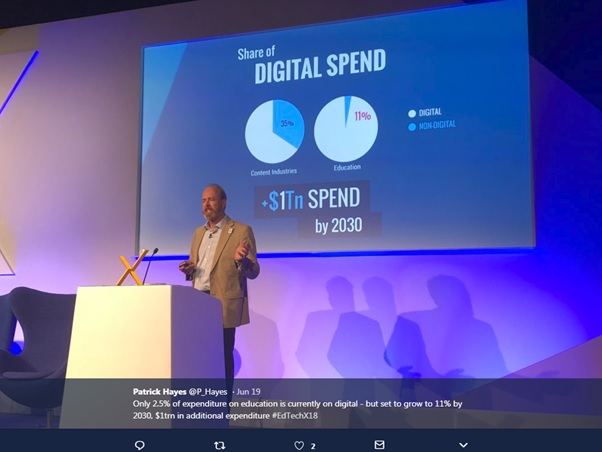
Patrick Hayes, 'digital spend' presentation at the EdTechxEurope summit, posted on twitter, CC0.
- Forecasts suggesting that over the next decade we will see nearly 800 million more K-12 graduates.
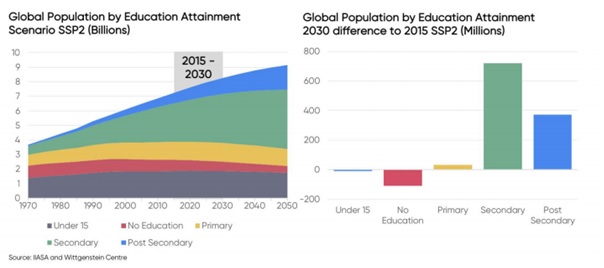
Global population by education attainment scenario, IIASA and Wittgenstein Centre, CC0.
-
A showcase of the New SuperPowers of Education: six major economies that make up 80% of the global demand for education, all of different stages of growth and maturity (Europe not being one them).
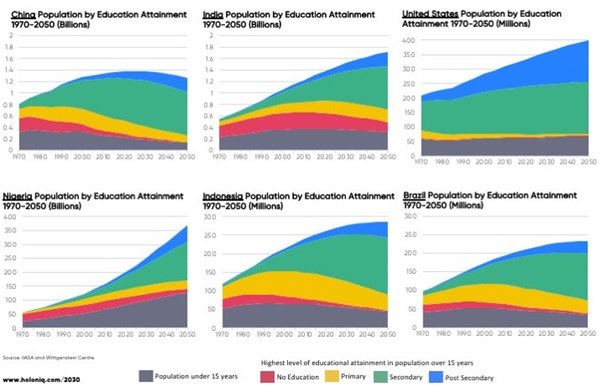
Population (by country) by education attainment scenario, IIASA and Wittgenstein Centre, CC0.
-
A discussion exploring the speed of technological developments and how this exceeds the rate of human adaptability. And further, the need to rethink concepts about learning and adapt this to how we teach.
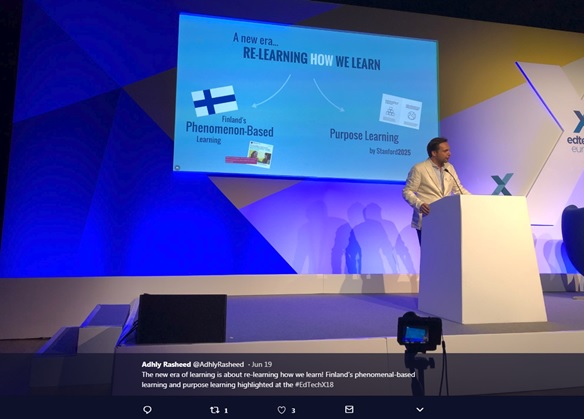
Adhly Rasheed, 're-learning how we learn' presentation at the EdTechxEurope summit, posted on twitter, CC0.
-
Exploring the topical concept of the rise of ‘Homo Eruditus’ (always searching for knowledge), the emergence of the ‘learning debt’ and the rise of the millennial workforce.
-
Discussing the new set of skills of the ‘Renaissance Worker’, and how the future belongs to them.
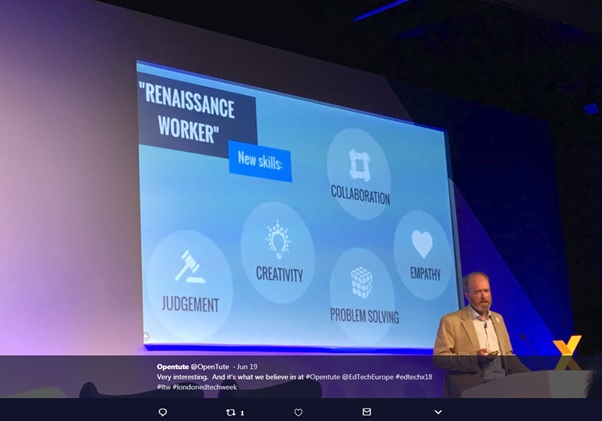
Patrick Hayes, 'renaissance worker' presentation at the EdTechxEurope summit, posted on twitter, CC0.
Digital culture fits well in this depiction of the future of education. Rich cultural heritage resources fuel digital learning by helping to improve the quality of learning materials, teaching practices and students’ experiences thus develop the skills needed for a global, interconnected and high-tech future.
Europeana panel - Ecosystem unite: Collaboration across the field as the key to unlocking progress
The impact of blending education and culture across education sectors was the focus of the Europeana panel ‘Ecosystem unite: Collaboration across the field as the key to unlocking progress’ at the EdTechxEurope summit. The session represented a good mix of international and organisational perspectives, with speakers including:
-
Alain Thillay, Ministry of Education, France,
-
Steven Stegers, Deputy Director of EUROCLIO, The Netherlands,
-
Federica Pascotto, Director of Art Stories startup, Italy and
-
Milena Popova, Business Development Manager, Europeana.
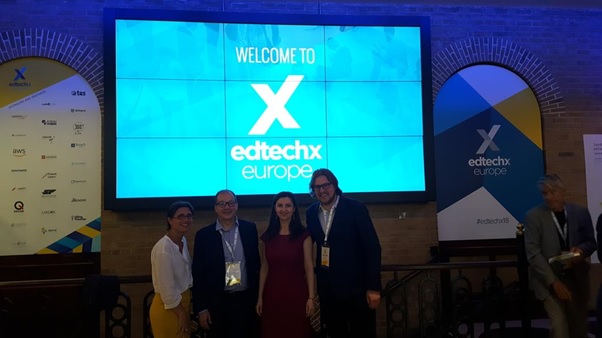
Ecosystems Unite panelists at the EdTechxEurope summit, by Milena Popova, CC0.
With Milena Popova as moderator, the panelists shared their insightful stories about the partnership with Europeana and showed how the integration of cultural content in their learning platforms and products has inspired learners across age groups, created business value and opened up new growth opportunities.
The audience was obviously engaged and raised questions about the localisation of educational resources and their impact beyond statistics. Interested app developers and platform/service providers, such as Quizlet and Microsoft, reached out to panel members with follow-up conversations. Over the course of the day, we also discussed potential partnerships with EdTech accelerators and investors.
The EdTechXEurope summit was a great opportunity for us to network with leaders in education and technology and creative thinkers across Europe. It was exciting to learn about the latest innovations in educational technologies and practices and to be part of the conversations about the EdTech future. We look forward to doing it all again in 2019!

